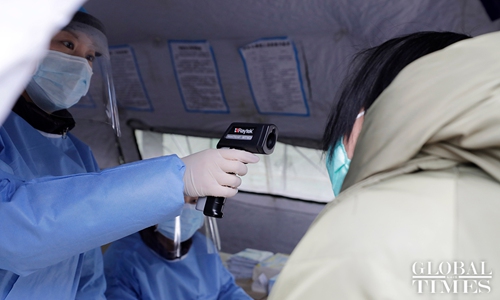HOME >> CHINA
Shanghai implements multidisciplinary treatment in fight against NCP
Source:Globaltimes.cn Published: 2020/2/10 3:25:16

Photo: Yang Hui/GT
Shanghai is increasing its efforts to save novel coronavirus patients listed in critical condition through multidisciplinary medical teamwork, individualized treatment plans, and advanced life support machines.
Lu Hongzhou, co-director of the Shanghai Public Health Clinical Center at Fudan University (SHAPHC), which has been equipped to receive confirmed cases, said the rate of critical and fatally ill patients admitted has accounted for less than 8 percent. In contrast, the fatality rate per case is 0.35 percent.
"The cure rate and fatality rate of critically ill patients reveal the advantages of multidisciplinary teamwork and our ability to treat critically ill patients," Lu said at a Shanghai Municipal government press conference on Sunday.
To ensure that every patient receives the best treatment, Shanghai has adopted methods according to their condition.
Critically ill patients are settled in a separate building. Every morning, a medical team of top respiratory and infection experts studies each patient to provide individual treatment. Six experts are stationed in the hospital 24-hours a day to detect problems promptly.
As Lu explained, treatment plans are adjusted daily according to each patient. "Through highly individualized treatment plans, patients can receive the most scientific treatment," he said.
Life-support machines have also played a leading role in treating critically ill patients.
"Artificial kidneys and artificial lungs have played a very important role. After one week of using ECMO (artificial lungs), we have saved a patient in critical condition. The day before yesterday, he was able to breathe without the machine," Lu said.
Patients with mild symptoms are monitored 24 hours a day, with doctors from respiratory, infection, intensive care units, and psychology departments making the rounds to provide care for them to prevent sudden deteriorating health conditions.
"While some patients had mild symptoms at the beginning with relatively low body temperature, symptoms could change dramatically in five to seven days. We will monitor patients whose conditions become worse and transfer them to intensive care units when necessary," Lu said.
As of Sunday, Shanghai confirmed 293 NCP cases with 228 in stable condition, and 44 cured.
Posted in: SOCIETY